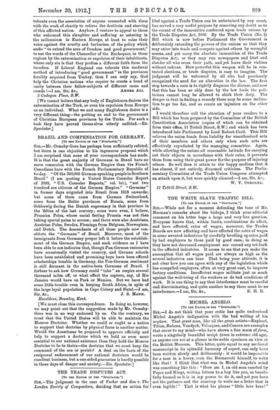THE WHITE SLAVE TRAFFIC BILL.
[TO THE EDITOR OP THE " SPECTATOR."]
SIn„—While not for a moment defending the tone of Mr. Norman's remarks about the bishops, I think your editorial comment on his letter begs a large and very live question. Everyone knows that, within limits, combinations do affect, and have affected, rates of wages; moreover, the Trades Boards are now affecting and have affected the rates of wages in some sweated industries by carefully levelling up rates paid by bad employers to those paid by good ones ; in doing so they have not decreased employment nor caused any set-back in the affected industries. It seems to me that you make the assumption that all wages paid are always as high as the several industries can bear. That being your attitude, it is not clear how you can agree with any of the legislation which has compelled employers, often at very great cost, to improve factory conditions. Insufficient wages militate just as much against the well-being of the workers as do bad conditions of work. It is one thing to say that interference must be careful and discriminating, and quite another to say there must be no


















































 Previous page
Previous page